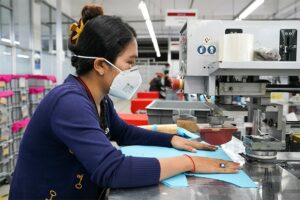Back in May 2021, Cambodia had its second lockdown in the capital city, Phnom Penh. The country was going through precautionary measures nationwide, and the garment industry’s factories had to adapt very quickly.
Veasna, an admin/human resource assistant manager in a Phnom Penh factory, reflected on just how much has changed since the pandemic hit: “This pandemic has taught me to be more prepared in a crisis,” she says. “At a personal level, I have learned to be more patient, communicate better with my colleagues and family, and be a more proactive person in how I practice hygiene.”
Veasna has attended various Better Factories Cambodia training and advisory sessions and has noted significant growth at both the factory level and personal level. One training which was co-organized with the Garment Manufacturers Associations in Cambodia (GMAC) in late 2021 highlighted safe working practices, specifically around risk assessment, control measures and embedding Standard Operating Procedures (SOPs) into the factory’s day.
“I thought my factory had done a lot during this pandemic, but after the training session I saw there is so much to learn and many more gaps to be filled,” Veasna said.
She highlighted that the factory was 100% in accordance with the guidelines by the Ministry of Health and now takes additional precautions as well, including internal controls like COVID-19 rapid tests administered to all the employees every two weeks, including drivers and security guards.
Veasna led new safety initiatives outside the factory walls too, including speaking with transportation drivers to ask them to reduce the maximum number of workers per truck by half, purchasing more trucks, and temporarily removing the fingerprint scan system – all playing a role in prevention and risk mitigation.
“If there is one thing to improve in my factory, it would be to be more adaptive; I want my team to have a collaborative mindset and be responsive to this ever-changing pandemic. The ‘new normal’ does not affect only our lives but also our work.”
